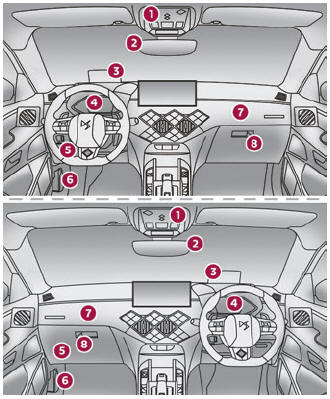DS 3: Practical information / Compatibility of fuels

Petrol fuels conforming to the EN228 standard containing up to 5% and 10% ethanol respectively.

Diesel fuels conforming to the EN590, EN16734 and EN16709 standards and containing up to 7%, 10%, 20% and 30% fatty acid methyl ester respectively. The use of B20 or B30 fuels, even occasionally, imposes special maintenance conditions referred to as "Arduous conditions".

Paraffinic Diesel fuel conforming to the EN15940 standard.
 The use of any other type
of (bio)fuel
(e.g. pure or diluted vegetable or animal
oils, domestic fuel) is strictly prohibited - risk
of damaging the engine and fuel system!
The use of any other type
of (bio)fuel
(e.g. pure or diluted vegetable or animal
oils, domestic fuel) is strictly prohibited - risk
of damaging the engine and fuel system!
 The only fuel additives
authorised for use
are those that meet the B715001 (petrol)
or B715000 (Diesel) standards.
The only fuel additives
authorised for use
are those that meet the B715001 (petrol)
or B715000 (Diesel) standards.
Diesel at low temperature
At temperatures below 0 °C (+32 °F), the formation of paraffins in summer-type Diesel fuels could prevent the engine from operating correctly. In these temperature conditions, use winter-type Diesel fuel and keep the fuel tank more than 50 % full.
At temperatures below -15 °C (+5 °F) to avoid problems starting, it is best to park the vehicle under shelter (heated garage).
Travelling abroad
Certain fuels could damage your vehicle’s engine. In certain countries, the use of a particular fuel may be required (specific octane rating, specific trade name, etc.) to ensure correct operation of the engine.
For all additional information, consult a dealer.
 Refuelling
Refuelling
Fuel tank capacity: approximately 44 litres
(Petrol) or 41 litres (Diesel).
Reserve level: approximately 6 litres.
Low fuel level
When the low fuel level is
reached, this
warning lamp lights up on the instrument
panel, accompanied by the display of a message
and an audible signal...
Other information:
DS 3 2016-2026 Owners Manual: Remote control function
The remote control can be used for the following remote functions, depending on version: Unlocking/Locking/Deadlocking the vehicle. Unlocking/Locking the boot. Folding/Unfolding the door mirrors. Folding/Unfolding the exterior door handles. Activating/Deactivating the alarm...
DS 3 2016-2026 Owners Manual: Lane positioning assist
For more information, refer to the General recommendations on the use of driving and manoeuvring aids. The system identifies the limits of the traffic lane and steers the vehicle inside this lane to maintain it in the lateral position chosen by the driver...
Categories
- Manuals Home
- 1st Generation DS 3 Owners Manual
- 1st Generation DS 3 Service Manual
- SCR system
- Tyre under-inflation detection
- Service indicator
- New on site
- Most important about car
Instruments and controls
These illustrations and descriptions are provided for information only, as the locations of certain elements may vary depending on the version or trim level.


